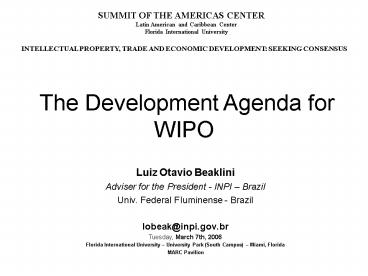The Development Agenda for WIPO - PowerPoint PPT Presentation
1 / 17
Title:
The Development Agenda for WIPO
Description:
addressing the issue of technical cooperation from a broader perspective; ... More incentive to direct transfer of knowledge and technical cooperation ... – PowerPoint PPT presentation
Number of Views:63
Avg rating:3.0/5.0
Title: The Development Agenda for WIPO
1
The Development Agenda for WIPO
SUMMIT OF THE AMERICAS CENTER Latin American and
Caribbean Center Florida International University
INTELLECTUAL PROPERTY, TRADE AND ECONOMIC
DEVELOPMENT SEEKING CONSENSUS
- Luiz Otavio Beaklini
- Adviser for the President - INPI Brazil
- Univ. Federal Fluminense - Brazil
- lobeak_at_inpi.gov.br
- Tuesday, March 7th, 2006
- Florida International University University
Park (South Campus) Miami, Florida - MARC Pavilion
2
The Agenda
- WIPO General Assembly, Sept. 2004
- Argentina and Brazil presented a proposal
relating to the establishment of a new
development agenda for WIPO - Co-sponsored by Bolivia, Cuba, Dominican
Republic, Ecuador, Egypt, Iran, Kenya, Peru,
Sierra Leone, South Africa, Tanzania and
Venezuela - Formation of Group of Friends of Development
3
What do the Agenda Seeks
- To incorporate the development dimension into
WIPOs work. - Insertion of questions related to development
into WIPO - Evaluation of benefits of I.P. protection should
not be automatic - (benefit should not be measured only by the
existing of I.P. Law and enforcement) - to promote a critical examination of the
implications for developing countries of the
adoption of increased IPR protection - To recognize that States at differing levels of
development face different challenges and have
different needs. - To effectively incorporate development promotion
as one of its main goals for ex. addressing the
issue of technical cooperation from a broader
perspective
4
The Document of Group Friends of
DevelopmentWO/GA/31/11 DATE August 27,
2004IIM/1/4 DATE April 6, 2005
- 4 main points
- Norm-Setting
- Technology Transfer
- Mandate and Governance
- Technical Assistance and Evaluation
5
Norm-setting issues 1/2
- Points under criticism
- Tendency of broadening the system of protection
- Movement toward world-patent
- Focus in certain interests of some specific
groups.
6
Norm-setting issues 2/2
- Suggestions
- New treaties should consider the implications on
their development impact. - consider the implications for development and
consumer - New treaties should be based on clearly defined
principles and guidelines and on an assessment of
their development impact - impact assessments and research on existing WIPO
administered treaties - Openness of WIPO discussions and decisions and
the participation of public interest groups in
discussions on an equal footing with
rightholders associations must be sought.
7
WIPOs mandate and governance 1/2
- Points under criticism
- WIPO activities and intellectual property
discussions are driven towards development-oriente
d results. The basic proposal of the
Development Agenda is that development should
be a central dimension in any negotiation
involving IP systems.
8
WIPOs mandate and governance 2/2
- Suggestions
- Strengthening the Role of Member States on WIPOS
decisions. - Establishing an Independent Evaluation and
Research Office - Provide a transparent, independent and objective
mechanism, through which WIPOs programmes and
activities would be evaluated with respect to
their development impact in general, and their
impact on innovation, creativity and access to,
and dissemination of knowledge and technology.
9
Technical Assistance 1/5
- Points under criticism
- it is critical to clarify that the development
dimension of intellectual property is NOT the
same thing as technical assistance. - In most cases, the underlying philosophy, content
and process of the technical assistance provision
is that more I.P. protection leads automatically
to more innovation and than, to economic social
well-being
10
Technical Assistance 2/5
- Points under criticism
- I.P. and development is usually reduced to
technical cooperation - While WIPO has made significant strides in
providing developing countries with technical
assistance, more need to be done to ensure that
such assistance is useful to development
objectives.
11
Technical Assistance 3/5
- Suggestions
- technical assistance to be of value to developing
and least developed countries, such assistance
needs to be planned and delivered based on
transparent principles and guidelines on the
basis of which an objective assessment of its
impact and effectiveness can be made. Principles
and guidelines established by the Member States
will provide a much needed road map for the
expansion and qualitative improvement of WIPOs
technical assistance.
12
Technical Assistance 4/5
- Suggestions
- wider transparency and participation of the
Member States in the - the design, delivery and evaluation of technical
assistance - The assistance should be tailored to meet each
countrys level of development and so correspond
to the needs of various stakeholders in
developing and least developed countries and not
just the intellectual property offices and I.P.
rightholders.
13
Technical Assistance 5/5
- Suggestions
- independent evaluation of the technical
assistance provided by WIPO, including to
determine the impact and effectiveness of the
assistance programmes.
14
Technology Transfer 1/3
- Points under criticism
- WIPO has concentrated its efforts in the
diffusion of standardized approaches to IP
policies that assume development follows suit
as intellectual property rights protection
is strengthened. So WIPO may have overlooked
the access to and diffusion of science,
technology and related knowledge and know-how,
especially for LDCs and developing countries.
15
Technology Transfer 2/3
- Suggestions
- appropriate protection criteria (e.g.
patentability) balanced monopolistic rights
derived from IPR. - More incentive to direct transfer of knowledge
and technical cooperation
16
Technology Transfer 3/3
- Suggestions
- a wellbalanced design of IPR as regards,
for example, exceptions for prior users,
experimental or fair use, adequate
disclosure, efficient and working requirements
and misuse defenses, may help both to unburden
competition policy and encourage private action
against undue claims for protection.
17
- Obrigado !
- Gracias!
- Thank you!
- Luiz Otavio Beaklini
- lobeak_at_inpi.gov.br
- lobeak_at_gmail.com































